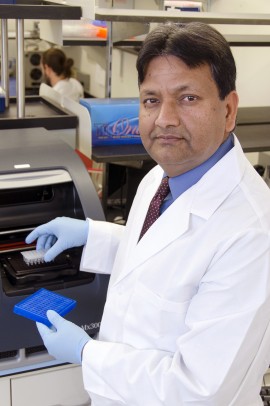Genetic link between adolescent drinking and adult anxiety may offer therapy target
Researchers at the University of Illinois Chicago have confirmed that drinking alcohol as an adolescent is tied to having anxiety as an adult. What’s more, the genetic link between the two could have promise as a drug target, they report in a new study.
UIC researcher Subhash Pandey studies how early exposure to alcohol reprograms the brain in ways that can lead to psychiatric disorders, such as anxiety, later in life.
In the study published in Translational Psychiatry, Pandey’s group at the Center for Alcohol Research in Epigenetics report their discovery of a new cellular switch at the center of this relationship. The factor, called EZH2, could be a promising drug target for reversing the lingering effects of early-life alcohol use.
The new research confirmed that the link between early alcohol exposure and later anxiety exists in both male and female rats, with a common mechanism.
“This study is further evidence that adolescent binge drinking produces epigenetic reprogramming in the brain,” said Pandey, the Joseph A. Flaherty MD Endowed Professor of Psychiatry in the College of Medicine.
Pandey previously identified a protein called Arc that is important in creating synapses in the amygdala, a brain region associated with emotion and anxiety. In rats and humans exposed to alcohol during adolescence, Arc levels in the amygdala were below normal into adulthood, suggesting a mechanism for the link between drinking and psychiatric symptoms.
The new study found a link that occurs earlier in the cellular chain reaction, the enzyme EZH2. Higher levels of EZH2 suppress transcription of the Arc gene.
After adolescent rats were exposed to alcohol, EZH2 levels increased in the amygdala. These animals later showed anxiety-like behavior in adulthood. But those given a blocker for EZH2 exhibited reduced anxiety-like behavior, and their Arc protein levels returned to normal.
The findings suggest that EZH2 may be a promising drug target for addressing anxiety and other psychiatric disorders in adults who drank during adolescence, Pandey said. Inhibitors of the enzyme have been developed by other groups as potential cancer therapies.
“Next is testing these small molecules, which can penetrate the blood-brain barrier, and observing its impact,” Pandey said.
Other UIC co-authors on the paper include John Peyton Bohnsack and Huaibo Zhang. The work was funded by grants from the National Institutes of Health (UO1AA019971, U24AA024605, RO1AA010005, and P50AA022538) and the U.S. Department of Veteran Affairs (I01 BX004517, IK6BX006030, F32AA027410).
Categories
Topics
alcohol, anxiety disorders, Center for Alcohol Research in Epigenetics, epigenetics

